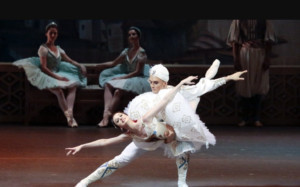 The Bolshoi Ballet LE CORSAIRE will be at the National Centre for the Performing Arts on May 18 through May 20. This production is choreographed by Marius Petipa and will be presented in three acts.
The Bolshoi Ballet LE CORSAIRE will be at the National Centre for the Performing Arts on May 18 through May 20. This production is choreographed by Marius Petipa and will be presented in three acts.
LE CORSAIRE tells the story of Conrad, a pirate who journeys across the high seas to save Medora, a beautiful harem girl. This tale of fantasy and adventure explores captive maidens, love and betrayal through a soaring score and breathtaking choreography. LE CORSAIRE with The Bolshoi Ballet features 17 incredible dancers.
Founded in 1776, the Bolshoi Theatre of Russia has been and will remain, one of the main symbols of Russian culture. It is the main national theatre, a bearer of the traditions of Russian music culture and centre of world music culture, the spearhead of development for the country's performing arts.
The internationally-renowned Bolshoi Ballet is among the oldest and worldwide acclaimed ballet classical companies. The first ballets to be produced were by French and Italian masters such as Filippo Beccari, Morelli brothers and Jean Lamiral. Before long, young Russian choreographers such as Adam Glushkovsky took over in prominence, concentrating on ballets with Russian themes. From 1820-1830 the company developed in the French tradition under the influence of Felicite-Virginie Hullin-Sor and Fanny Elssler who familiarized the Moscow public with works of Jules Perrot and other masterpieces of romantic ballet. Marius Petipa's
Don Quixote, which received its premiere in Moscow on December 26th, 1869 was acknowledged to be the visiting card of the Moscow Company, a work that was infringing all Imperial Theatres' traditions, had transferred from Moscow to Petersburg. Alexander Gorsky, Petipa's assistant and pupil, was appointed to the Bolshoi Theatre in 1900 and from then on until his death in 1924, he revised the company's stagings of the basic repertoire, making them more dramatic and realistic and laying the foundations for the company's great future successes.
Following the October Revolution in 1917, left-wing critics demanded the removal from the repertoire of classical works. However, more moderate voices prevailed and, during the Soviet period, traditional nineteenth-century ballets were performed alongside contemporary works.
With the transfer of the capital from Petrograd to Moscow, the Bolshoi had become the country's first theatre, a repository of the best creative talents. Olga Lepeshinskaya, Marina Semenova, Galina Ulanova, Maya Plisetskaya, Natalia Bessmertnova, Ekaterina Maximova, Nina Timofeyeva, Asaf Messerer, Alexei Ermolaev, Mikhail Lavrovsky, Vladimir Vasiliev, Maris Liepa were among the great principal dancersof the 20thcentury. Leonid Lavrovsky and Yuri Grigorovich had enabled "the golden age" of Soviet ballet.
Today chef-d'oeuvres of classical ballet, such as
Giselle,
La Sylphide,
Swan Lake,
The Sleeping Beauty,
La Bayadère,
Don Quixote,
Raymonda,
Le Corsaire, as well as 20th century's masterpieces of Yuri Grigorovich such as
A Legend of Love,
The Nutcracker,
Spartacus,
Ivan the Terrible,
Romeo and Juliet,
The Golden Age, occupy a leading place in the Bolshoi Ballet repertoire.
It also presents to its public specially commissioned ballets, among which are Alexei Ratmansky's
The Bright Stream,
The Bolt,
Lost Illusions and
Romeo and Juliet, Yuri Possokhov's
Cinderella,
A Hero of Our Time and
Nureyev,
Christopher Wheeldon's
Misericordes, Angelin Preljocaj's
And Then One Thousand Years of Peace, Tatiana Baganova's
The Rite of Spring,
The Taming of the Shrew by Jean-Christophe Maillot, and
Ondine by Vyacheslav Samodurov.
Another important goal is to introduce the Russian public to the achievements of the world's great choreographers; its repertoire includes works by
George Balanchine,
Roland Petit, Pierre Lacotte,
John Cranko, John Neumeier, JiríKylián, Mats Ek,
William Forsythe,
Wayne McGregor, Harald Lander, Alberto Alonso, Hans van Manen, Paul Lightfoot and Sol León.
Nowadays Bolshoi dancers,
Svetlana Zakharova, Ekaterina Krysanova, Anna Nikulina,
Olga Smirnova, Yulia Stepanova, Kristina Kretova, Vladislav Lantratov, Denis Rodkin, Ruslan Skvortsov, Artem Ovcharenko,
Semyon Chudin, and others ensure that the Bolshoi's standards remain as high as ever.
Makhar Vaziev, former director of the Mariinsky Theatre and Teatro alla Scala Ballet, was appointed Ballet Director in 2016. Today's Bolshoi Ballet employs more than 200 dancers combining a pride of place in its artistic heritage with an awareness that it must grow and develop to prosper in today's rapidly changing world.
For tickets and more information, please visit http://en.chncpa.org/whatson/zdyc/201802/t20180215_182881.shtml
Comments
To post a comment, you must
register and
login.

 The Bolshoi Ballet LE CORSAIRE will be at the National Centre for the Performing Arts on May 18 through May 20. This production is choreographed by Marius Petipa and will be presented in three acts.
The Bolshoi Ballet LE CORSAIRE will be at the National Centre for the Performing Arts on May 18 through May 20. This production is choreographed by Marius Petipa and will be presented in three acts.

